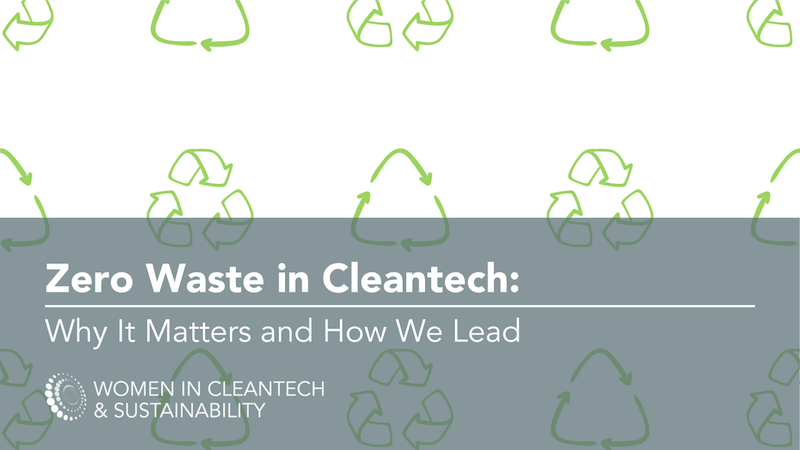Zero Waste in Cleantech: Why It Matters and How We Lead
Women in Cleantech and Sustainability | October 3, 2025
Zero Waste in Cleantech: Why It Matters and How We Lead
The world generates over 2 billion tons of waste annually, and this amount is expected to increase by 70% in 25 years if no action is taken. Waste exacerbates climate issues and causes harm to all living things. Landfills emit 20% of all human-related methane greenhouse gases and are 80 times more potent than carbon dioxide (CO2).
Fortunately, waste can be an opportunity to rethink material design, use, and reuse. Circular life cycle products will catalyze cleaner and sustainable systems with zero-waste by-products.
What is Zero Waste?
Zero waste is a distinct entity from recycling, as it involves redesigning systems to prevent waste before production begins.:
Rethink & Redesign: Create products with longevity, repairability, and end-of-life recovery in mind. For example, solar panels designed to be disassembled manageably, and constituted of recyclable materials, can save valuable resources, like glass, silicon, and metals, from being lost.
Reduce: Use fewer resources to achieve zero waste and increase operational efficiency. Minimal inputs during production enable a streamlined supply chain, thereby expanding capacity to serve consumers interested in reducing their single-use purchases. A reduction in demand for single-use products is expected to occur when zero-waste alternatives become accessible and cost-effective. If demand significantly shifts to circular products, then extraction and manufacturing emissions for wasteful materials will decline.
Reuse: Keep materials in circulation. Refillable packaging, second-hand markets, and remanufactured Electric Vehicle (EV) batteries are practical examples of reuse preserving value while reducing virgin resource extraction.
Compost: Organic waste is an advantageous resource. Food scraps and green waste enrich soils, sequester carbon, and do not produce methane emissions like landfills.
Zero waste is a systemic business model shift that requires accountability for a product’s entire life cycle.
The Cleantech Connection
Waste challenges and opportunities also exist in the clean economy.
Solar Panels: Without intervention, an estimated 78 million tonnes of photovoltaic (PV) waste is expected to accumulate by 2050. Investing in enhanced recycling systems will lead to the recovery of critical materials, reduce costs, and contribute to the development of a more circular economy.
Wind turbines: Approximately 43 million tonnes of turbine blade waste are expected by 2050. Composite recycling and alternative blade materials, such as bio-based compositions and thermoplastics, as well as upcycling technologies, are being piloted to achieve closed-loop systems.
EV batteries: Estimates warn that over 50 million EV battery packs will be uselessly retired by 2050. However, repurposing for stationary energy storage and establishing closed-loop recycling can drastically reduce their potential for waste and conserve industrial metals, lithium, cobalt, and nickel.
Construction & Buildings: Construction and Demolition (C&D) debris accounts for more than 30% of global solid waste. Safer deconstruction strategies, modular construction, and the development of markets for reclaimed materials are shifting built environments toward circularity.
Stringent waste management plans and circular product designs are imperative for cleantech to achieve sustainability goals.
Women Leading the Way
Women cleantech pioneers are trailblazing new ways to think about and overcome humans’ perpetual waste problem:
Teresa Bradley, MSEM, TRUE Advisor, CEO of Race to Zero Waste, is leading community programs such as zero-waste campuses and public event “waste stations” to make sustainable choices accessible to all.
Denise Braun, Co-Founder of All About Waste, is leveraging two decades of experience in sustainable building and environmental solutions to help organizations, ranging from corporate offices to construction sites, reduce waste through data-driven strategies.
Sara Eve Fuentes (she/her), Founder of SmartWaste Inc and Chairwoman of WCS, is advancing technologies to optimize waste management for capital projects and operations, and amplifying advocacy for circular solutions within the cleantech community.
Research strongly indicates that companies with higher proportions of women in leadership are more likely to adopt circular economy practices and improve resource efficiency. Diversity drives innovation, and innovation drives zero waste.
Call to Action
This October, take the Zero Waste Pledge at ZeroWasteMonth.org and commit to small, systemic changes in your daily and professional life.
At Women in Cleantech & Sustainability, we are proud to convene innovators, entrepreneurs, and professionals tackling these challenges head-on. Together, we can transform waste from a liability into a resource that spearheads the shift to a circular, regenerative economy.
✨ What role does your sector play in building a zero-waste future? Share your perspective in the comments.

